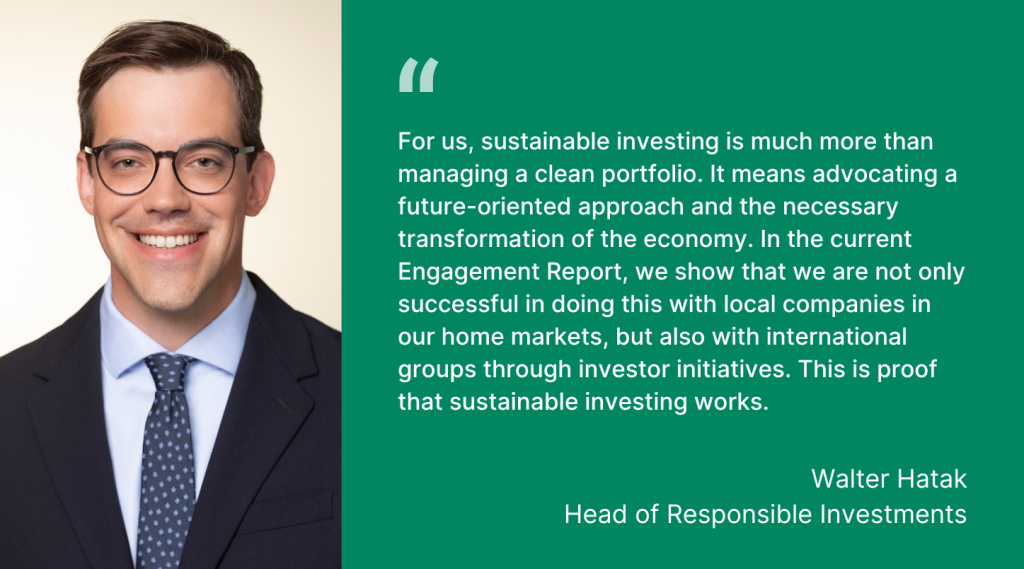It is finally here – our Engagement & Voting Report 2023!
And what better time to report on the past year of engagement than now? So, let’s not wait any longer and take a look at what happened.
Erste AM and engagement
The fact that active ownership comes with a long tradition at Erste AM is not new. Therefore, we are once again presenting in detail our integrated ESG management system, which forms the basis for all our sustainable equity, bond, and mixed funds, this year. The aim is to provide an insight into our daily active ownership work. What sustainability indicators and topics do we discuss with companies? How can we encourage companies in general to adopt a more sustainable corporate policy?
As the name suggests, we try to do this via two different channels, firstly by voting at annual general meetings (voting) and secondly through dialogue directly with the companies (engagement). Both are central pillars of our investment approach.

Company dialogue
For some years now, we have also been committed to reversing the loss of biodiversity through active engagement. Time is of the essence: according to the United Nations, over one million plant and animal species are already acutely threatened by extinction. The WWF also emphasises that the global vertebrate population has declined by a staggering 69% since 1970, i.e. by almost 70% in less than 50 years. (Note: WWF’s 14th Living Planet Report analysed the period from 1970 to 2018).[1]
At the same time, the economy depends on nature all over the world; in fact, 50% of global GDP is directly dependent on nature and its services. As biodiversity declines and species loss increases, potential climate risks are becoming ever more apparent and financial losses ever more likely. Lamentably, however, many companies still disregard their environmental impact and their direct dependence on the environment.
Stepped-up focus on biodiversity
In order to preserve biodiversity and thus counteract the climate crisis, we have increasingly focussed on those companies that exert a particularly large impact on biodiversity on the basis of their product portfolio. We have therefore decided to join the Nature Action 100 investor initiative. Over 200 institutional investors are already part of this collaborative investor initiative, which engages in dialogue with 100 companies from pre-identified key sectors that are regarded as systemically relevant to reversing the loss of nature and biodiversity by 2030.
In the second half of 2023, the investor groups for the future biodiversity dialogues were formed with the companies from the relevant sectors. Together with other investors, Erste AM has taken on the engagement with Bayer AG. We already held the first dialogues with the company in the first half of 2024. You can find out more about Bayer’s involvement in the Bayer AG blog post.
Dialogue with local companies
In addition to the newly launched engagement with Bayer AG, we have also reinforced the dialogue with our local companies. For example, we held several meetings with OMV AG as part of the Climate Action 100+ commitment. The subject of the meetings included the net zero carbon benchmark, the establishment of the Sustainability and Transformation Committee at supervisory board level, and climate accounting (for example, are net zero scenarios already accounted for in value adjustments?)
We also held ESG dialogues with local companies in the Czech Republic, Slovakia, and Romania. It is worth taking a look at the Engagement & Voting Report!
Voting
Exercising (our) voting rights is also an important part of the active ownership approach. This can have a real impact on environmental protection and contribute to the sustainable development of companies.
In 2023, we cast voting rights for EUR 7.4bn worth of Erste AM share capital and for 547 companies at 598 Annual General Meetings (AGMs) in a total of 33 countries. The months of April, May, and June are always the strongest voting months. Accordingly, around 72% of all AGMs were held in these three months.
Even more support for environmental and social shareholder motions
In the 2023 voting season, we decided to further increase our support of environmental and social motions. Our approval rate for environmental and social motions rose again by one percentage point compared to the previous year to now 81%. It is worth noting that our support rate for environmental motions alone has climbed by 7% to 98%. The majority of environmental motions dealt with topics such as the general alignment of climate targets with the Paris Climate Agreement, but climate lobbying and the financing of fossil fuels were also increasingly raised as issues. On the social motions front, motions on human rights, DEI (diversity, equity and inclusion), and health & safety dominated the field.
As we are increasingly committed to stopping the loss of biodiversity, as already mentioned, we have also had an official Erste Asset Management Biodiversity Policy in place since 2023. In this policy, we define specific measures and targets for how we can integrate biodiversity more strongly through increased consideration in engagement and voting.
Curious to know which motions we actually supported? The voting behaviour of Erste Asset Management is publicly available at www.erste-am.com/en/voting. Definitely worth a click!
Shareholder rights
It is important for us to consistently oppose all attempts by various companies to restrict fundamental shareholder rights and prevent votes demanded by shareholders to align companies more closely with the Paris climate targets.
For example, the international oil companies Exxon Mobil and Total Energies have prevented corresponding votes at the AGM, including through the courts. We oppose these efforts to restrict fundamental shareholder rights and have signed several open letters to the United States Securities and Exchange Commission (SEC).
For more on TotalEnergies, please visit our blog post on this topic.
What else is on your 2024 agenda?
We want to deepen our commitment with Bayer, and we want to do it the right way. We are therefore now also part of two other initiatives that deal with the protection of biodiversity and pesticide production. In addition to Nature Action 100, we are also part of the ShareAction Pesticide Working Group and the PRI Spring Initiative.
ShareAction is an NGO that has set itself the task of promoting responsible investment. Its pesticide campaign aims to draw attention to the immense risks to biodiversity posed by the pesticide industry. SPRING is an initiative by PRI for the protection of nature and brings together institutional investors to use their collective influence to stop or reverse the global loss of biodiversity by the year 2030.
What else has been going on so far this year?
Since Q1 2024, we have also been part of the thematic stewardship programmes Net Zero Transition (engagement with 100 companies from sectors with high emissions on the topic of transition) and Human Capital Management (with the aim to conduct a dialogue on DIE (diversity, equity, and inclusion) with 50 companies, primarily from the healthcare sector). In the Net Zero Transition programme, we have already managed to exchange ideas with several companies on various net zero issues. For example, we have had constructive discussions with representatives from Fortum Oyj, Galp Energia, BASF, Air Liquide, Deutsche Lufthansa, and the French oil and gas group TotalEnergies.
The Human Capital Management engagement programme focuses on the transformative power of people analytics and the undeniable potential of technological innovation in developing, executing, and measuring the effectiveness of human capital management initiatives. The programme is still in its initial phase. We are currently seeking initial contact with several companies, and the actual dialogues will kick off in Q3.
2024 has started as exciting as the engagement year 2023 ended. You can get an initial insight into this year’s AGM season in my colleague Stefanie Schock’s article. So, you can already look forward to the Engagement & Voting Report 2024!
[1] WWF-Report: Artenkrise spitzt sich zu (Biodiversity is getting worse)
This article is part of the July 2024 issue of our ESGenius Letter. All other articles in this issue, as well as previous versions of our sustainability publication ESGenius Letter, can be found on our website.
👉 Read now
Legal disclaimer
This document is an advertisement. Unless indicated otherwise, source: Erste Asset Management GmbH. The language of communication of the sales offices is German and the languages of communication of the Management Company also include English.
The prospectus for UCITS funds (including any amendments) is prepared and published in accordance with the provisions of the InvFG 2011 as amended. Information for Investors pursuant to § 21 AIFMG is prepared for the alternative investment funds (AIF) administered by Erste Asset Management GmbH pursuant to the provisions of the AIFMG in conjunction with the InvFG 2011.
The currently valid versions of the prospectus, the Information for Investors pursuant to § 21 AIFMG, and the key information document can be found on the website www.erste-am.com under “Mandatory publications” and can be obtained free of charge by interested investors at the offices of the Management Company and at the offices of the depositary bank. The exact date of the most recent publication of the prospectus, the languages in which the fund prospectus or the Information for Investors pursuant to Art 21 AIFMG and the key information document are available, and any other locations where the documents can be obtained are indicated on the website www.erste-am.com. A summary of the investor rights is available in German and English on the website www.erste-am.com/investor-rights and can also be obtained from the Management Company.
The Management Company can decide to suspend the provisions it has taken for the sale of unit certificates in other countries in accordance with the regulatory requirements.
Note: You are about to purchase a product that may be difficult to understand. We recommend that you read the indicated fund documents before making an investment decision. In addition to the locations listed above, you can obtain these documents free of charge at the offices of the referring Sparkassen bank and the offices of Erste Bank der oesterreichischen Sparkassen AG. You can also access these documents electronically at www.erste-am.com.
Our analyses and conclusions are general in nature and do not take into account the individual characteristics of our investors in terms of earnings, taxation, experience and knowledge, investment objective, financial position, capacity for loss, and risk tolerance. Past performance is not a reliable indicator of the future performance of a fund.
Please note: Investments in securities entail risks in addition to the opportunities presented here. The value of units and their earnings can rise and fall. Changes in exchange rates can also have a positive or negative effect on the value of an investment. For this reason, you may receive less than your originally invested amount when you redeem your units. Persons who are interested in purchasing units in investment funds are advised to read the current fund prospectus(es) and the Information for Investors pursuant to § 21 AIFMG, especially the risk notices they contain, before making an investment decision. If the fund currency is different than the investor’s home currency, changes in the relevant exchange rate can positively or negatively influence the value of the investment and the amount of the costs associated with the fund in the home currency.
We are not permitted to directly or indirectly offer, sell, transfer, or deliver this financial product to natural or legal persons whose place of residence or domicile is located in a country where this is legally prohibited. In this case, we may not provide any product information, either.
Please consult the corresponding information in the fund prospectus and the Information for Investors pursuant to § 21 AIFMG for restrictions on the sale of the fund to American or Russian citizens.
It is expressly noted that this communication does not provide any investment recommendations, but only expresses our current market assessment. Thus, this communication is not a substitute for investment advice.
This document does not represent a sales activity of the Management Company and therefore may not be construed as an offer for the purchase or sale of financial or investment instruments.
Erste Asset Management GmbH is affiliated with the Erste Bank and austrian Sparkassen banks.
Please also read the “Information about us and our securities services” published by your bank.


